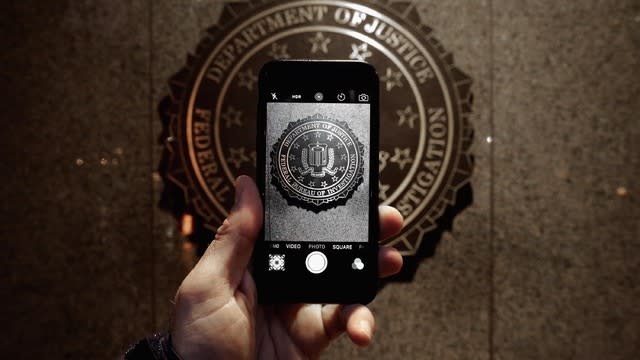Making sense of the FBI’s abrupt Apple trial postponement

Photo: Bloomberg Video
Less than 24 hours before the FBI was set to face off with Apple in a highly publicized battle over access to a San Bernardino shooter’s iPhone, investigators had an apparent breakthrough.
After many statements and much legal testimony from law enforcement insisting that Apple’s assistance was the only way to unlock the iPhone of Syed Rizwan Farook, the Department of Justice filed a motion Monday to delay its hearing because, just the day before, “an outside party demonstrated to the FBI a possible method” for unlocking Farook’s phone.
The sudden move is an unexpected twist in what has become a dramatic clash between law enforcement and the world’s most valuable tech company over the reach of government surveillance in modern times.
In so abruptly changing course, investigators have undercut many of the legal arguments they were relying on to gain access to the device. This decision comes after a series of technical mistakes both in written testimony and in the FBI’s initial investigation of Farook’s phone. Now, as the FBI seeks an alternate way of accessing Apple devices, there are new questions about the security of the company’s operating system and the newfound methods of the FBI.
On a call Monday evening, Apple attorneys were careful not to frame the DOJ’s delay as a sign of victory. The company was informed of the FBI’s motion to vacate at 2:30 p.m., but not given any details of the potential access method or “outside party” that it plans to use to access the information on Farook’s iPhone. Apple’s lawyers did, however, draw a stark contrast between FBI agents’ assertions under oath that they had exhausted all avenues in accessing the phone and the agency’s statement today that it “has continued to pursue all avenues available to discover all relevant evidence related to the attacks.” The hearing is now postponed until a check-in date on April 5.
Earlier in the day at an Apple product announcement, CEO Tim Cook made a statement about the company’s fight to protect encryption.
The eleventh-hour request to cancel the hearing could be a potential sign that the FBI wants to drop its order entirely, according to Nate Cardozo, a staff attorney at the Electronic Frontier Foundation, a digital-rights group.
“The government was taken by surprise by the strength of Apple’s opposition and the amount of support they were able to garner both in the tech community and the civil liberties community,” he told Yahoo News. “The government wanted to frame this as security versus privacy. But I think Apple was successful in reframing it as security versus security.”
The FBI’s discovery of an outside source to aid in unlocking Farook’s iPhone has raised eyebrows among security experts, as many have long speculated that the National Security Agency could help break into the phone. During a hearing about encryption before the House Judiciary Committee, FBI Director James Comey said his organization has “talked to anybody who will talk to us about it,” implying that “anybody” also included government organizations. However, the following week, the American Civil Liberties Union detailed a way that law enforcement could have easily worked around the iPhone’s auto-erase feature.
“This suggests that the FBI either doesn’t understand the technology well enough or wasn’t telling us the full truth earlier when it said that only Apple could break into the phone,” ACLU attorney Alex Abdo said in a statement. “Either possibility is disconcerting.”
Earlier this month, whistleblower Edward Snowden challenged the notion that enlisting Apple’s cooperation was the FBI’s only hope in the San Bernardino case. “Respectfully, that’s bull****,” he said via a video stream from Moscow to the Common Cause Blueprint for a Great Democracy conference.
The DOJ is still pursuing a similar case in which it is demanding access to the iOS 7 operating system of a drug dealer’s iPhone in a criminal investigation. New York Federal Judge James Orenstein recently ruled strongly in Apple’s favor, and law enforcement appealed. But given the way the FBI has undercut its argument in the San Bernardino case, Cardozo says it’s possible that the agency could be ready to back off from the larger fight of encryption altogether.
“It’s tempting to think that there’s something weird going on, but I never ascribe to malign intent before I ascribe to incompetence,” he told Yahoo News. “It kind of just seems like incompetence rather than conspiracy at this point.”

